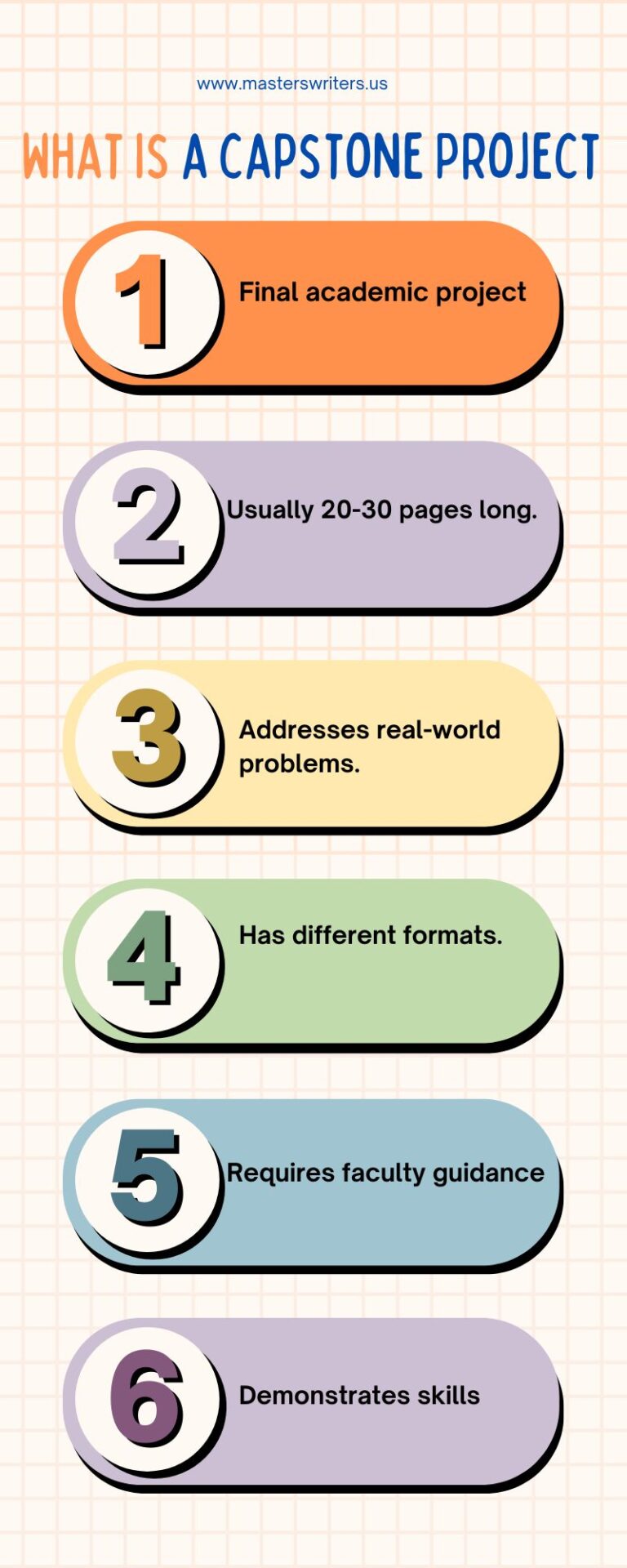Essay Writing Guides
What is a Capstone Project?


As students approach the conclusion of their academic careers, they face an essential and comprehensive assignment known as the capstone project. But what precisely is a capstone project?
In this article, we will unravel the concept of capstone projects, exploring their significance, purpose, and the various forms they can take. By understanding these elements, students can better prepare for this pivotal academic challenge and showcase their accumulated knowledge and skills.
What is a Capstone Project?
A capstone project is a comprehensive assignment that serves as a culminating academic experience for students, typically during their final year of high school or college. It integrates and applies the knowledge and skills acquired throughout their coursework to address a specific problem, conduct research, or create a product. The project often involves extensive research, practical application, and a final presentation or report. Capstone projects vary in form, including research papers, creative works, business plans, or community service projects, depending on the student’s field of study and interests.

Never Written Capstones Before?
Professional writers across dozens of subjects can help you right now.
Why is a Capstone Project Important?
A capstone project is vital because it enables students to synthesize all the knowledge they’ve gained during their academic journey and apply it to real-world challenges.
It serves as a comprehensive test of their abilities and understanding. Through these projects, students gain practical experience, hone their critical thinking skills, and develop problem-solving capabilities.
Additionally, it offers an opportunity to showcase their expertise and readiness for future endeavors, whether that involves entering the workforce or pursuing further education.
What is the Purpose of a Capstone Project?
The purpose of a capstone project is to provide students with an opportunity to apply their accumulated knowledge and skills to real-world scenarios. It aims to enhance their critical thinking, problem-solving, and research abilities while allowing them to demonstrate their academic and intellectual growth.
By working on a capstone project, students can bridge the gap between theoretical learning and practical application, preparing them for future professional or academic pursuits. Below is a detailed discussion on the purpose of a capstone project.

Integration of Knowledge and Skills
Capstone projects require students to utilize the knowledge and skills they have accumulated during their academic journey. These projects are crucial as they help students consolidate their learning and apply it to a practical problem or initiative. This synthesis allows students to demonstrate their expertise and readiness for graduation or their chosen career paths.
Culmination of Learning
Serving as the culmination of a student’s academic efforts, capstone projects provide an opportunity to apply theoretical concepts to real-world situations. By addressing a significant issue or project, students showcase their comprehension of academic concepts and their ability to implement practical solutions, thereby solidifying their educational experience.
Professional Development
Capstone projects are instrumental in fostering skills essential for future careers. These projects serve as concrete evidence of a student’s abilities, which can be presented to potential employers or graduate schools. Whether through conducting research, delivering presentations, or collaborating with peers, students gain valuable experiences that enhance their professional preparedness.
Types of Capstone Projects
Capstone projects vary significantly depending on the academic discipline, institution, and program requirements. Here are some common types:
Type of Project | Description |
Research-Based Projects | Conduct original research within a specific field, including formulating hypotheses, collecting data, and analyzing results. |
Practical Application Projects | Apply theoretical knowledge to real-world problems, often in partnership with businesses or organizations. |
Creative Projects | Create original artistic works or projects, demonstrating proficiency and creativity in areas like art, design, or media. |
Policy Analysis/Case Studies | Analyze existing policies or case studies, evaluate their effects, and propose informed recommendations. |
Interdisciplinary Projects | Collaborate with other disciplines to tackle complex problems from multiple perspectives, integrating diverse expertise. |
Service-Learning Projects | Integrate academic learning with community service, addressing societal issues and promoting civic responsibility. |
The Difference Between a Thesis and a Capstone Project
Here’s a breakdown of the key differences between a thesis and a capstone project:
Aspect | Thesis | Capstone Project |
Purpose | The primary aim of a thesis is to contribute new knowledge or insights to the academic field through original research and analysis. | The purpose of a capstone project is to integrate and apply the knowledge and skills acquired throughout an academic program to address a practical problem or challenge in a real-world context. |
Scope | Theses are typically extensive and in-depth, involving significant independent research and multiple chapters such as literature review, methodology, results, and discussion. | Capstones are usually narrower in scope, focusing on a specific issue or project, often involving practical applications like designing a solution or creating a product. |
Format | Theses follow a traditional academic format, including sections like introduction, literature review, methodology, results, discussion, and conclusion, and are often peer-reviewed. | Capstones can vary in format, including written reports, presentations, portfolios, prototypes, creative works, or multimedia presentations, tailored to the specific project requirements. |
Audience | Theses are intended for an academic audience, including professors, researchers, and scholars, contributing to scholarly discourse and future research. | Capstone projects are often designed for a broader audience, such as stakeholders, industry professionals, policymakers, or community members, aiming to address practical problems or challenges. |
How to Write a Capstone Project
Creating a successful capstone project involves several actionable and meaningful steps:
- Select a Relevant Topic Choose a topic that matches your academic interests and program requirements, while also being relevant to real-world issues. Focus on challenges within your field that need exploration or solutions. Conduct thorough research to ensure the topic is both feasible and impactful.
- Set Clear Objectives Define the specific goals of your capstone project. What are you trying to achieve? Whether it’s solving a problem, answering a research question, or creating a product, make sure your objectives are SMART (Specific, Measurable, Achievable, Relevant, and Time-bound).
- Conduct In-Depth Research Investigate existing literature, theories, and evidence related to your topic. Identify gaps, controversies, or areas needing further investigation. Use this research to build a strong foundation for your project.
- Create a Detailed Plan Outline a structured plan for your project, including key milestones, tasks, and deadlines. Break down the project into manageable phases such as literature review, data collection, analysis, and presentation. Regularly monitor your progress to ensure you stay on track.
- Ensure Methodological Rigor If your project involves research, choose appropriate methods, tools, and techniques. Develop a detailed research design or project plan addressing key methodological considerations like sampling, data collection, analysis, and validity. Follow ethical guidelines throughout the process.
- Analyze and Interpret Data Use suitable analytical techniques and tools to analyze your data or findings. Interpret the results in relation to your research questions or objectives, highlighting significant patterns or insights. Evaluate the implications of your findings within the broader context of your field.
- Communicate Your Findings Present your capstone project in a clear, concise, and engaging manner. Whether through a written report, presentation, or multimedia deliverable, tailor your communication to your audience. Clearly articulate your research questions, methodology, findings, and conclusions, and use visuals and real-world applications to enhance understanding.
Final Thoughts
Completing a capstone project is a significant milestone in a student’s academic journey. It provides an invaluable opportunity to integrate and apply the knowledge and skills gained throughout their coursework to real-world challenges. This culminating experience not only demonstrates their academic capabilities but also prepares them for future professional or academic endeavors. Whether it’s through conducting in-depth research, developing innovative solutions, or creating impactful projects, the capstone project embodies the essence of higher education’s goal: to foster critical thinking, problem-solving, and practical application. As students embark on this final academic endeavor, they should embrace the challenge and view it as a stepping stone to their future success.

Due Date Is Just Around the Corner?
Streamline the writing progress with our expert service!
FAQs
What is an example of a capstone project?
An example of a capstone project could be a business student developing a detailed business plan for a new startup. This project might involve market research, financial analysis, and strategic planning to create a viable business proposal. Another example is an engineering student designing and building a prototype of a renewable energy device.
What is considered a capstone project?
A capstone project is considered a comprehensive, multifaceted assignment that serves as a culminating academic experience. It typically involves applying knowledge and skills from various courses to solve real-world problems, conduct research, or create a product. These projects can take many forms, including research papers, practical projects, creative works, or case studies.
Is a capstone project hard?
The difficulty of a capstone project can vary depending on the scope of the project and the student’s preparedness. It often requires significant time, effort, and critical thinking. However, with proper planning, time management, and support from advisors, it can be a rewarding and manageable experience.
Why is it called capstone?
The term “capstone” comes from the final stone placed at the top of a building or structure, symbolizing the completion of the construction process. Similarly, a capstone project represents the culmination of a student’s academic journey, serving as the final and integrative academic experience that showcases their accumulated knowledge and skills.
Sources
Southern New Hampshire University. What is a capstone project in college. https://www.snhu.edu/about-us/newsroom/education/what-is-a-capstone-project
The Glossary of Education Reform. Capstone project. https://www.edglossary.org/capstone-project/

